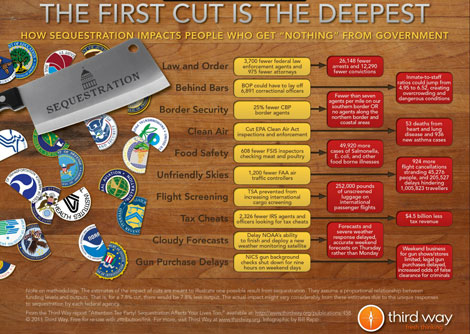If the congressional “super committee” fails to come up with a deal by Thanksgiving — as the media and public now predict — all kinds of automatic budget cuts will take place across the federal government. Decimal points will be moved and programs trimmed without much deliberation. To meet the $1.2 trillion deficit-reduction goal, the Congressional Budget Office estimates that non-defense discretionary spending will have to take an immediate 7.8 percent cut across the board — and that number could cut away at anything.
“It’s meant to be painful and idiotic,” said David Kendall, a senior fellow with the centrist think tank Third Way. “And it would be.”
This threat, though, still sounds pretty abstract: if the “super committee” that was just created a few months ago fails to complete a negotiation that the public can’t follow firsthand, perhaps programs you’ve never heard of won’t exist anymore through the maddeningly named process of “sequestration.”

Miller-McCune’s Washington correspondent Emily Badger follows the ideas informing, explaining and influencing government, from the local think tank circuit to academic research that shapes D.C. policy from afar.
This is where Kendall comes in with some numbers. Those cuts, during fiscal year 2013, would mean 12,290 fewer convictions of criminals by federal agents. They would mean 49,920 more people would contract food poisoning. Perhaps worst of all: 45,276 airline passengers would be stranded at the gate — and more than a million would be late on arrival — as a result of all the air traffic controllers Uncle Sam wouldn’t be able to afford any more.
“And weather reports — they’re a basic thing we all take for granted,” Kendall said. “Unless somebody puts up those satellites that track the weather, you don’t get weather reports.”
In compiling a list of just some of the potential consequences of a super committee fail, Kendall and researchers at Third Way have tried to tap into the imagination of the most hard-core anti-government stalwarts (perhaps including the people who think we should scrap whole agencies of government all together). They’ve even compiled a handy chart on “How Sequestration Impacts People Who Get ‘Nothing’ From Government.”

Third Way arrived at these numbers with the help of reports from the agencies tracking their own performance metrics. And these projections are, of course, a collective thought exercise more than a prophecy. But the idea is to inject the specter of real consequences into what’s becoming a common meltdown in Washington.
“There are two problems wrapped up here,” Kendall said. “One is that a lot of what government does is invisible to people. And at the same time, the benefits of government that are direct and popular are not the ones that are really easy to go after. It’s a double whammy.”
The super committee, that is, isn’t seriously looking at Social Security or Medicare.
Other potential targets: the border with Mexico would become more porous, gun purchase background checks would be delayed, and 252,000 pounds of cargo would go unscreened on international flights.
“Law enforcement is something that people universally think is a good thing, so we’d have fewer criminals locked up,” Kendall said. “And we’d have more food poisoning. The bite of your next hamburger would not be as safe because of fewer inspectors” — about 608 fewer, that is — “and the list goes on.”
At the IRS, that 7.8 percent budget cut might target 2,326 revenue agents who would otherwise be busy looking for people who cheat their neighbors out of $4.5 billion in owed tax revenue.
Kendall remains optimistic that the trigger will work as it was intended — that the super committee will be moved to action by Washington’s favorite kind of deadline: the one were everyone gets embarrassed by failure. It might help, though, if more people came to fear the threat of E. coli and uncaptured criminals.
“Right now, all the legislators are getting are calls about, ‘Don’t touch this. Don’t touch that,’” Kendall said. “If you get calls about, ‘Yeah, don’t cut things I didn’t even know were going to be cut,’ I think that would help.”
Sign up for the free Miller-McCune.com e-newsletter.
“Like” Miller-McCune on Facebook.
Follow Miller-McCune on Twitter.
Add Miller-McCune.com news to your site.





